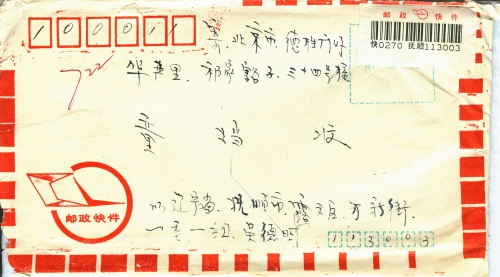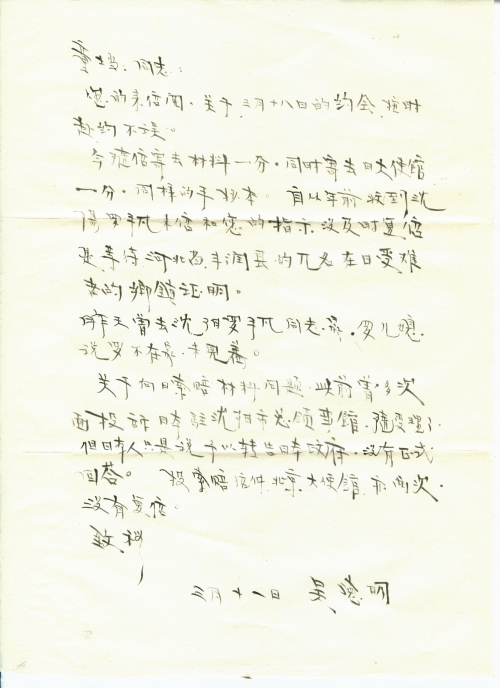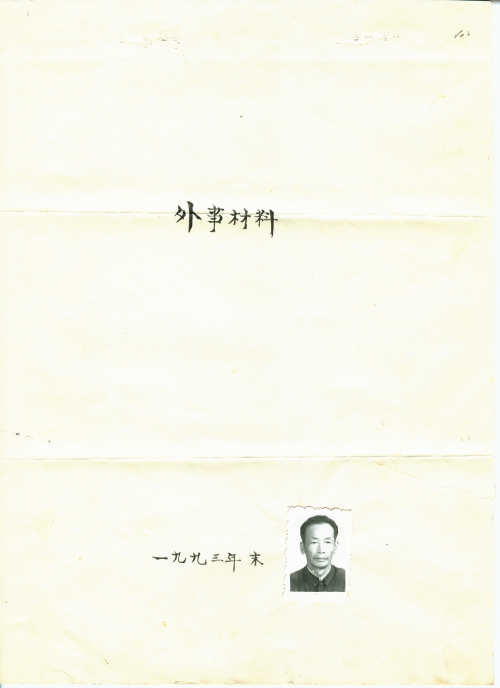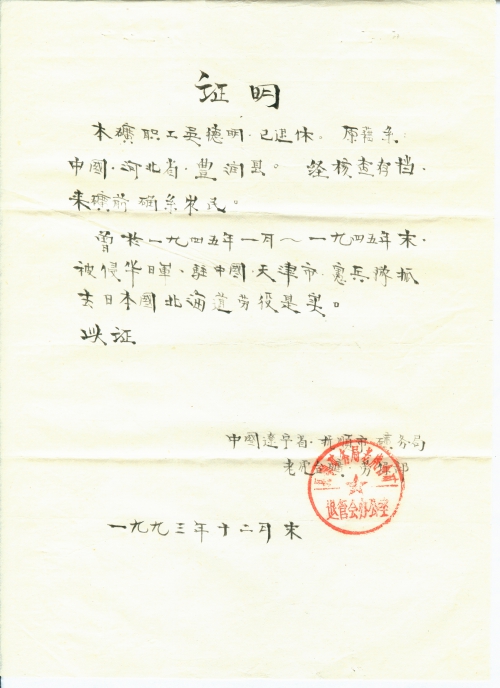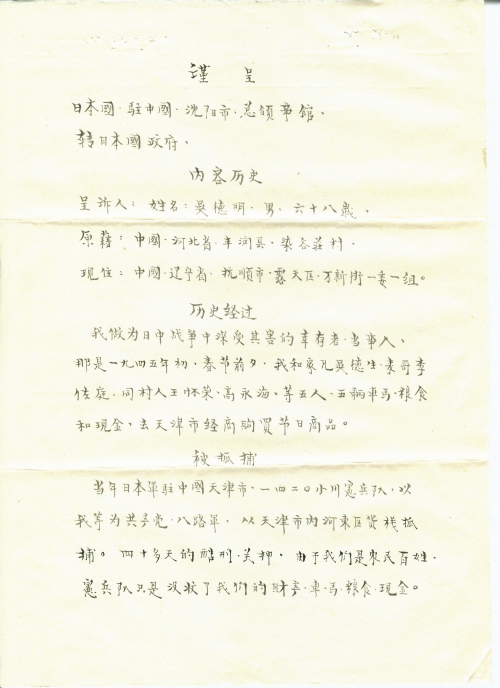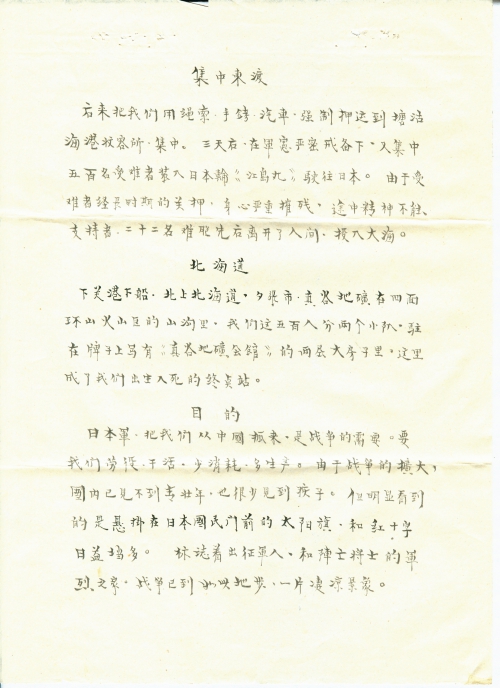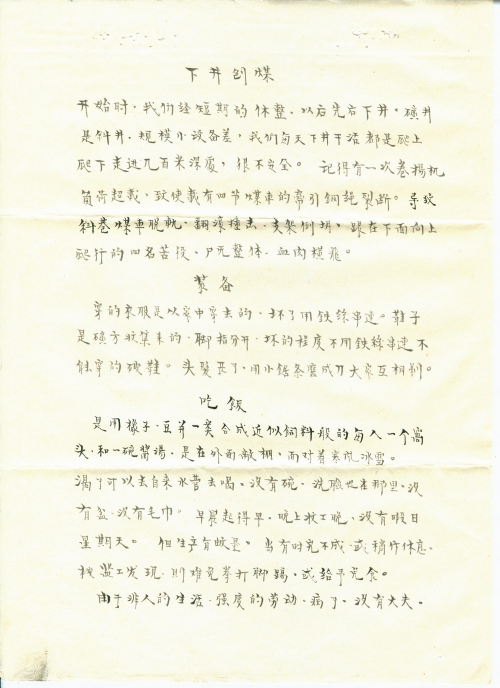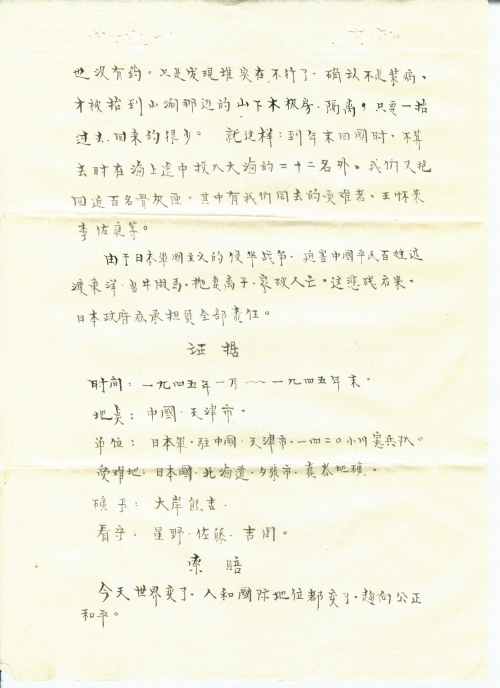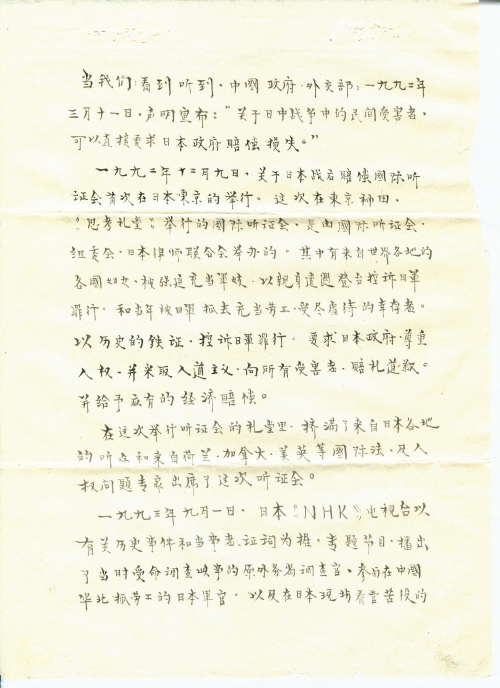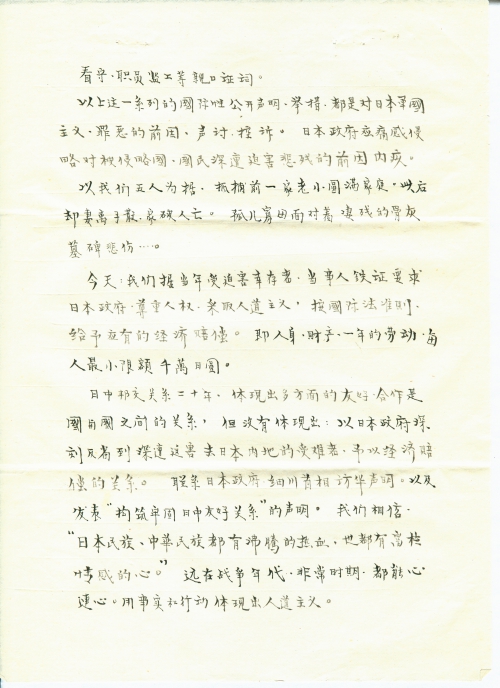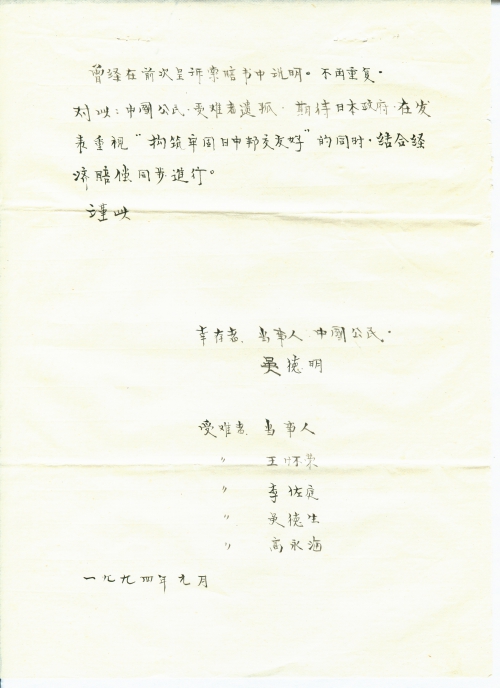Date of letter:1994-09
Address of author:Fushun City, Liaoning Province
Date of event:1945
Location of event:Tianjin City
Name of author:Wu Deming and his cousin Li Zuoting, townsmen Wang Huairong, Wu Desheng and Gao Yonghai
Name(s) of victim(s):Wu Deming and his cousin LiZuoting, townsmen Wang Huairong, Wu Desheng and Gao Yonghai
Type of atrocity:Slave Laborers(SL)
Other details:Wu Deming (origin place: Fengrun County, Tangshan City, Hebei) was caught by Japanese to do hard labor from Jan. 1945 to the end of the year. In early 1945 before the spring festival, Wu Deming and his cousin Li Zuoting, townsman Wang Huairong and other two people went to shop and do business in Tianjin. Unfortunately they were taken as members of the Communist Party and arrested by Japanese. After being tortured for over 40 days, they were escorted to do labor in Japan. 22 people died in the journey and were thrown into the sea. Enclosed is a proof document from Wu’s working place.
Comrade Tong Zeng:
I’ve read your letter and our meeting on March 18 is confirmed.
I am enclosing a hand-written copy of the materials; a copy of the materials was also sent to the Japanese Embassy in China. The reason why I did not immediately reply to Shenyang City’s Luo Pingfan’s letter and your instructions, which were received at the end of last year, was because I was waiting for the official certification of the victims in the county of Fengrun, Hebei.
I went to comrade Luo Pingfan’s house in Shenyang yesterday, but missed him. His daughter-in-law said he was not at home.
In regards to filing claims for compensation, the letters were submitted to the Japanese consulate in Shenyang numerous times, leading to their eventual acceptance of the petition. However, the Japanese staff merely stated that they would forward the letters to the Japanese government. There was never a formal reply to the demand for compensation. I’ve twice sent letters to the Japanese embassy in Beijing, but received no replies either.
Best regards,
Wu Deming
March 11
Foreign materials
End of 1993
Certificate
This is to certify that Wu Deming, now retired, was an employee at our mine, was born in Fengrun, Hebei. We hereby verify that he was a farmer prior to his employement at the mine. We further verify that Wu Deming was captured by the invading Japanese gendarmerie stationed in Tianjin, China and that he was subsequently sent to do hard labor in Hokkaido, Japan from January 1945 to the end of 1945.
Bureau of Mines of Fushun, Liaoning, China
Labor Department of Lohutai Mine (Seal)
End of December 1993
To the Japanese Consulate in Shenyang, China,
In care of the Japanese government,
History Content
Complaint: Wu Deming, male, 68 years old
Place of birth: Ranguzhuang, Fengrun, Hebei, China
Current address: No. 1 Group, No. 1 Community, Wanxin Street, Lutian, Fushun, Liaoning, China
History
I am a survivor and victim of the Sino-Japanese war. It was before the Chinese New Year of 1945, I, along with my elder brother Wu Desheng, my cousin Li Zuoting and Wang Huairong and Gao Yonghai from the same village were riding five carriages stocked with food and cash to the Business Department of Tianjin to purchase goods for the New Year holday.
Got arrested
The Japanese No. 1420 Ogawa gendarmerie stationed in Tianjin, China arrested us at a goods shop in Neihedong, Tianjin on a suspicion of being members of the Communist Eighth Route Army. We suffered over 40 days’ of torture and detention. , The Gendarmerie found no proof of the charges, and that we were really just farmers, they neverless confiscated all of our property, carriages, food and cash.
Being Shipped to Japan
Later, we were tied up with ropes and handcuffs and forcibly sent by cars to a shelter at the Tanggu Harbor. Three days later, 500 kidnapped victims were taken to board a Japanese ship named EJIMA-MARU under tight surveillance of Japanese soldiers. The captured victims suffered from severe physical and mental distress during the voyage. Twenty two Chinese compatriots could not stand the torture and perished. One by one, they threw themselves into the sea during the voyage.
Hokkaido
After getting off the Shimonoseki port, we were taken to Shintani Mine in Yubari, Hokkaido, located in a ravine at the heel of a volcano surrounded by mountains. We were divided in two teams and lived in a big two-storey house with a plate that read “Shintani Mine House”. This place became the destination where we lived or dies.
Purpose
The Japanese army kidnapped us here from China for the needs of their war. They wanted us to labor, work and create production with a minimum subsistence as possible.. As the war progressed and expanded, we saw no young and able men around, very few children also. But increasingly, we saw the Japanese national flags and the Red Cross symbols being hung on the doors of Japanese houses. These were the families of dead soldiers who left for war. It was a desolate scene the war brought!
Digging for Coal in a mine
In the beginning and after a short-term rest, we went into the mine. The opening was a shallow shaft, this was a small mine with poor equipment. Every day, we descended and climbed hundreds of meters into the mine and work in extremely unsafely condition. I remember there was one time the hoister was overloaded and when the traction rope carrying four coal carriages snapped, one of the coal carriages derailed and went flying and crashed into a bracket. The bodies of the four laborers following the carriage were torn into pieces.
Daily Supplies
Our clothes were what we had worn when we were arrested. When they were torn, we fastened them with wires. The shoes were collected by the mine. They were so worn that they couldn’t even be fixed with wires. When our hair grew long, we sharpened a small saw into a knife to shave our heads.
Food
Each of us was given a bun made of mixed acorns and beans, similar to animal feed, and a bowl of soup, to eat in an open tent exposed to cold wind, ice and snow. We drank from a water pipe without a cup. That was where we washed also; no basins, no towels. We worked from dawn to late at night, no breaks or holidays or weekends. But there was a production quota. We would be beaten or punished by not giving us food if we couldn’t meet the production target or if the supervisor saw us taking a rest.
The treatment was inhuman and work was excessive. There were no doctors or medicine when people succumb to the harshness. Those seriously ill or those who were deemed not “acting sick” would be carried to a wooden shed at the foot of the mountain near the river in quarantine. Once being sent to the shed, very few of them actually made it back. So, not accounting the 22 of our compatriots who threw themselves into the sea on our way to Japan, we held nearly 100 cremation urns in our arms and to take them back with us when we returned to China at the end of the year. Included, were the ashes of Wang Huairong and Li Zuoting, who were taken to Japan with us at the same time.
The Japanese militarism started the war of aggression against China, kidnapped Chinese civilians to Japan and forced them to do hard labor. The Japanese broke up our families, forced us to leave our wives and children, made us into slave workers without compensation, caused enormous suffering and many people to die. The Japanese government should take full responsibility for what they had done to the victims of their wrong doing and to the families of the victims.
Evidence
Time: From January 1945 to the end of 1945
Place: Tianjin, China
Organization: Japanese No. 1420 Ogawa gendarmerie stationed in Tianjin, China
Place of suffering: Shintani Mine in Yubari, Hokkaido, Japan
Head of the mine: Kumakichi OGISHI
Guards: surnamed HOSHINO, SATO and YOSHIOKA
Compensation Demand
The world has changed today and the awareness of people has changed. We are living in a more fair, just world.
We saw, and heard the spokesperson of the Ministry of Foreign Affairs of China announced on March 11, 1992, “Civilian victims of the Sino-Japanese war can file claims for compensation against the Japanese government directly.”
On December 9, 1992, an international hearing about Japan’s post-war compensation was co-sponsored by the International Hearing Society, the International Organizing Committee and Japan Association of lawyers at the Thinking Hall in Kanda, Tokyo, Japan for the first time. At the hearing, women forced to be Japanese soldiers’ comfort women from all over the world testified to the charges of Japanese army’s horrible crimes of sex slaves and described their personal experience as comfort women. The survivors of forced laborers also provided solid evidence of the kidnapping and enslaving and charged the Japanese army with crimes. They charged the Japanese government for violations of human rights and demanded an apology and proper compensations.
The hall was crowded with Japanese people and international law and human rights experts from the Netherlands, Canada, the United States and UK.
On September 1, 1993, Japan’s NHK TV channel broadcasted a show in which a former official with the Foreign Affairs Ministry, the Japanese army officers participating in capturing laborers from Northern China as well as the guards, staff and supervisors managing the laborers on the site in Japan provided their testimonies..
The series of international public announcements and actions are adamant denouncement against Japanese militarism and the war crimes they committed against people. The Japanese government should sincerely apologize for causing so much suffering to the people of the countries they invaded during the war.
For the five of us, we each had a happy family until we were kidnapped. The Japanese broke up our families. The wives and children of the killed had only been given a cremation urn. How sad that was!
Thus today, we demand that the Japanese government respect our human rights and pay compensation to each of the victims for their lost health, property and one-year labor in the amount of no less than RMB 10 million Yuan according to the established norms and standards of international law and humanitarianism.
China and Japan have diplomatic ties for 20 years, reflecting a good will of the nations to partnership, but there was no sign that the Japanese government will make retributions to the suffering of the victims of their war of aggression. Prime Minister HOSOKAWA’s statement during his visit to China of “…developing a solid Sino-Japanese friendship” make us believe that both the Japanese and Chinese people are passionate and friendly people. Far back in the war and sensitive periods, there were cases where two peoples united in humanitarianism. The relationship of the two countries could also be based on humanitarianism.
I will not repeat the description contained in the last petition.
The Chinese citizens and victims expect the Japanese government, in the spirit and parallel to their speech of “emphasizing and developing a solid Sino-Japanese friendship”, to make just economic compensations to the people victimized by the war.
Survivor, victim, Chinese citizen: Wu Deming
Victim: Wang Huairong
Victim: Li Zuoting
Victim: Wu Desheng
Victim: Gao Yonghai
September 1994















